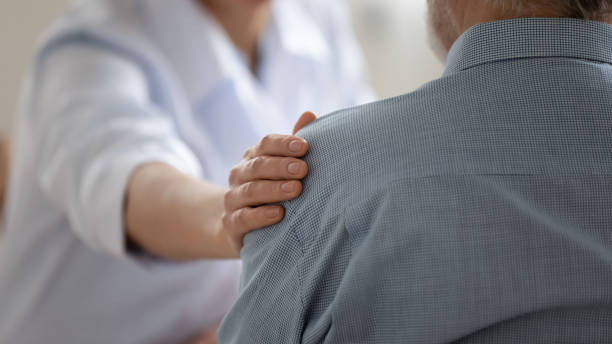Last Updated on May 15, 2023
Depression is a common and often misunderstood mental health condition. It can make individuals feel sad, empty, and disconnected from the world around them. But the good news is that depression is treatable.
In this guide, we’ll explore the symptoms, causes, diagnosis, and treatment options for depression.
Whether you’re struggling with this condition or trying to support someone who is, we’ll provide you with the information you need to move forward with hope and confidence.
Before we go on, it’s important to know that a friend who is depressed may not show obvious symptoms. You should check on your loved ones as often as you can.

Depression and Its Prevalence
Depression is a severe mental health disorder characterized by persistent feelings of sadness, hopelessness, and disinterest in activities that were once enjoyed.
It can significantly impact a person’s ability to function daily and can lead to a range of physical and emotional symptoms.
Depression is a prevalent condition that affects people of all ages, genders, and backgrounds.
According to the World Health Organization, an estimated 264 million people worldwide are depressed. It is the leading cause of disability in the United States, and the number of people affected by depression has been increasing steadily over the past few decades.
In the US, depression is one of the most common mental health disorders, with an estimated 8.4% of adults experiencing at least one major depressive episode each year.
However, depression is not a sign of weakness or personal failure. It is a medical condition that requires treatment and support, just like any other illness. Seeking professional help for depression can lead to improved outcomes and a better quality of life.
Read: What are Natural Remedies for Common Health Issues?
Why We Must Learn About Depression
Understanding this mental health condition is important for several reasons. Firstly, depression is a common mental health disorder affecting millions worldwide. But you might be able to escape the dire consequences of this condition if you are well-informed and take the necessary precautions.

Knowing the signs and symptoms can help individuals identify the condition and seek appropriate treatment.
Secondly, depression is often misunderstood, and there are many misconceptions about the disorder. Educating yourself about the condition can help you dispel these myths and better support individuals who are struggling with the condition.
In addition, depression can have significant impacts on an individual’s life and the lives of those around them. By understanding this mental health disorder, individuals can develop greater empathy and compassion for those who are affected by the condition.
This can lead to more effective support and reduced stigma surrounding mental health disorders.
Finally, depression is treatable. Knowing the available treatment options and how to access them can help individuals receive the help they need to manage their symptoms and improve their quality of life.
Read: How to Bounce Back From Pregnancy and Postpartum Depression
Symptoms of Depression
Some common symptoms are often associated with depression. Understanding these symptoms can help individuals recognize when they or someone they know may be struggling with depression and seek appropriate treatment.
Here are some of the symptoms you should look out for:
Persistent Feelings of Sadness or Hopelessness
One of the most common symptoms of depression is a persistent feeling of sadness or hopelessness. People who are depressed may feel like life is not worth living or that they have no purpose or joy in their lives.
Loss of Interest in Activities
Depression can cause individuals to lose interest in activities, such as hobbies, socializing, or spending time with loved ones. They may feel like they have no energy or motivation to engage in these activities, even if they know they used to find them pleasurable.
Read: Why is Good Hygiene Essential for Health?
Changes in Sleep and Appetite
Depression can also cause changes in sleep patterns and appetite. Individuals may find themselves sleeping more or less than usual or experiencing changes in appetite such as overeating or not feeling hungry at all.
Difficulty Concentrating or Making Decisions
A depressed person may find it challenging to concentrate or make decisions, even about relatively straightforward tasks. They may feel like they are in a fog or have difficulty thinking clearly.
Feeling Worthlessness or Guilty
Individuals suffering from depression may have negative thoughts about themselves. They may feel like they are a burden to others or responsible for adverse events. This can lead to feelings of guilt, shame, and low self-esteem.
Physical Symptoms
Depression can also cause physical symptoms such as headaches, stomach aches, and fatigue. These symptoms may result from changes in the brain and body that occur during this time.
Read: Do I have an Anxiety Disorder?
Causes of Depression
The causes of depression can vary between individuals. However, several common factors are known to contribute to the development of depression.

Here are some of them:
Genetics
Research has shown that genetics can play a role in the development of depression. Individuals with a family history of depression are more likely to develop the disorder themselves, and certain genes may be associated with an increased risk of depression.
However, a genetic predisposition to a condition does not guarantee you will have it. It simply means that you might be more vulnerable to it than someone with different genetic makeup.
Brain chemistry
Imbalances in brain chemicals, called neurotransmitters, can also contribute to depression. These chemicals are responsible for regulating mood, and changes in their levels or function can cause individuals to experience symptoms of depression.
Trauma
Stressful life events, such as the loss of a loved one, financial difficulties, or relationship problems, can contribute to the likelihood that a person becomes depressed.
Read: What is Post-Traumatic Stress Disorder (PTSD)?
Individuals who experience ongoing stress or trauma, such as abuse or neglect, may also be at increased risk.
Medical Conditions
Certain medical conditions, such as chronic pain, thyroid problems, or cancer, can contribute to depression. Additionally, some medications used to treat medical conditions can have depression as a side effect.
Substance Use
Substance use, particularly hard drugs, and alcohol can contribute to the development of depression. These substances can disrupt brain chemistry and cause individuals to experience depressive symptoms.
Read: Substance Abuse and Addiction: Causes, Treatment, Recovery
Diagnosis of Depression
Diagnosing depression can be challenging. This is because the disorder can manifest in different ways, and symptoms can vary between individuals.
However, there are several steps that healthcare professionals can take to accurately diagnose the condition.

Medical History and Physical Exam
The first step is to conduct a medical history and physical exam. Healthcare professionals will ask individuals about their symptoms and medical history to rule out any physical conditions contributing to their symptoms.
Diagnostic Criteria
To be diagnosed with depression, individuals must meet specific criteria outlined in the Diagnostic and Statistical Manual of Mental Disorders (DSM). The DSM lists symptoms that must be present for a particular duration and severity to meet the criteria.
Psychological Assessments
Healthcare professionals may also use psychological assessments to help diagnose depressive behavior. These assessments can help to identify the severity of symptoms and any other mental health conditions that may be present.
Laboratory Tests
In some cases, healthcare professionals may also order laboratory tests to rule out other medical conditions that may be contributing to symptoms.
Ongoing Evaluation
After a diagnosis of depression has been made, ongoing evaluation and monitoring are essential to ensure that treatment is effective and to identify any changes in symptoms. Regular check-ins with healthcare professionals can help individuals to manage their symptoms and adjust treatment as needed.
Available Treatment Options for Depression
There are effective treatments for people who are depressed.

Here are some of them:
Psychotherapy
Also known as talk therapy, psychotherapy involves working with a trained mental health professional to explore and address the underlying causes of depressive behavior. This can help individuals develop coping strategies and resilience to manage symptoms.
Medication
Antidepressant medications can help to control symptoms of depression by balancing brain chemistry. However, it’s important to note that these medications can take several weeks to take effect, and individuals may need to try different medications to find the right one for them.
Lifestyle Changes
Making lifestyle changes such as regular exercise, a healthy diet, and adequate sleep can also help to manage symptoms of depression. Reducing stress and engaging in relaxing activities, such as meditation or yoga, can also be beneficial.
Transcranial Magnetic Stimulation (TMS)
Transcranial magnetic stimulation (TMS) is a non-invasive procedure that uses magnetic fields to stimulate nerve cells in the brain. TMS is effective in treating depression in individuals who have not responded to other treatments.
Electroconvulsive Therapy (ECT)
Electroconvulsive therapy (ECT) is a treatment that involves passing an electrical current through the brain to trigger a seizure. ECT is generally used as a last resort for individuals who have not responded to other treatments and can be highly effective in managing severe depression.
Alternative Therapies
In addition to traditional treatments, alternative therapies can also be used to manage depression. These may include acupuncture, massage, and herbal remedies. While research on the effectiveness of these therapies is limited, some individuals find them helpful in managing their symptoms.
Support Groups
Joining a support group or participating in group therapy can also be beneficial for individuals with depression.

These groups provide a supportive environment where individuals can share their experiences and learn coping strategies from others.
Depression Hotlines
If you or someone you know is depressed or showing symptoms, please call these hotlines immediately:
- Substance Abuse and Mental Health Administration (SAMHSA) Helpline: 1-800-662-4357
- National Suicide Prevention Lifeline: 1-800-273-8255
- Samaritans: 1-877-870-4673
- National Hopeline Network: 1-800-442-4673
- Veterans Crisis Line: 1-800-273-8255
Before you go…
Hey, thank you for reading this blog to the end. I hope it was helpful. Let me tell you a little bit about Nicholas Idoko Technologies. We help businesses and companies build an online presence by developing web, mobile, desktop, and blockchain applications.
We also help aspiring software developers and programmers learn the skills they need to have a successful career. Take your first step to becoming a programming boss by joining our Learn To Code academy today!
Be sure to contact us if you need more information or have any questions! We are readily available.











